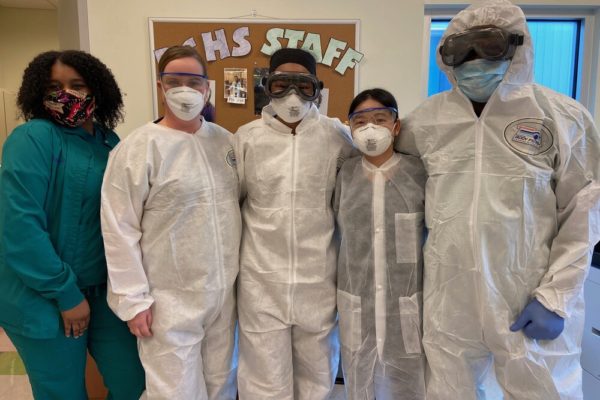[Steve Noblett is the Executive Director of the Christian Community Health Fellowship in Memphis, TN. This article is posted with permission from the CCHF website.]
In 2005, New Orleans took a direct hit from a category 3 hurricane. For over 100 miles both sides of I-55 were jammed with folks fleeing the storm. The city flooded. More than 70% of occupied housing was destroyed or damaged. Hospitals were incapacitated. 1,500+ people died. Over 50% of the population left for longer than 3 years, and less than half ever returned. Hurricane Katrina was a perfect storm that decimated a great city. Two months ago over a million people flocked to New Orleans. Crowds of partiers from across the country packed the French Quarter. It was Marti Gras 2020. It was at the beginning of the COVID pandemic in America, and it was another perfect storm.
The first cases of COVID-19 in Memphis (my hometown) were from people who attended Mardi Gras. That is true of other cities as well. In New Orleans, less than fourteen days later doctors were busy treating COVID-19+ cases, and ICUs were slammed with respiratory patients. A score of New Orleanians had already died from the virus. New Orleans became one of the major outbreak cities of this pandemic. Within 3 weeks, only New York and Washington states had more cases.
Because of the severity of the outbreak, New Orleans’ spread of coronavirus peaked on April 2, and deaths from the virus peaked five days later. New Orleans is still shut down. Isolation is still in place. But New Orleans is one of few places in America on the down side of the now famous pandemic curve.
Baptist Community Health Services of New Orleans (BCHS) opened in 2013 in the Lower 9th Ward, the neighborhood hit hardest during the Katrina disaster. They now have 5 sites across New Orleans and the north shore of Lake Pontchartrain. Dr. Hannah Pounds is the CMO, and has been part of BCHS since its inception. Shawn Powers, a former missionary who lived in China for many years, is CEO. I spoke at length with Hannah and Shawn this week. I wanted to know how this crisis impacted their clinic, and was eager to hear what a clinic on the other side of the curve might share with the rest of us.
BCHS has been a Look-Alike clinic for several years, but last September their application for a new site in nearby Mandeville was approved as an FQHC. They had 120 days to get the site open, which happened on January 9. The wheels of change were already in high gear when the coronavirus threat became a reality. Shawn believes that because transformation and growth were already happening, changes to respond to COVID came easier. The comfort of status-quo was not an obstacle.
The outbreak impacted almost everyone in New Orleans. In the first few weeks, several BCHS staff members lost relatives to the virus, and one of their physicians was diagnosed COVID+. Those early days were stressful. But the staff pulled together and remained courageous throughout the crisis. The doc with the virus continued to take patient calls by phone from his home, and on one occasion God used him to help save a young man’s life.
Local church partnerships proved to be a game-changer. In mid-January BCHS’s priority turned to stocking up on supplies ahead of the virus. But suppliers were already back-ordering N95 masks and PPE. Their limited supplies quickly dwindled, and fear among staff was understandably high. During one morning devotion a team member shared the story of how God taught the Israelites to depend on him one day at a time by providing manna each morning. That morning BCHS had only 3 masks left for each site. But shortly after devotion time, a call came in from a church partner that had been part of disaster and restoration efforts after Katrina. He had found 400 N95 masks in an old storage locker and wanted to bring them by. Over the next few weeks other churches called with similar stories, and Baptist Disaster Relief was able to locate over 1000 masks for them. The staff never ran out of PPE, even during peak times.
I asked Shawn and Hannah what they would share with CCHF professionals in cities that are not at peak yet:
- One practice that proved invaluable was a weekly all-staff ZOOM meeting. At first the meetings were about preparation for what was coming. But they began including a short time of ministry from local pastors, and they had a psychiatrist sit in on the meetings. Staff-care became a priority, and that made a difference.
- This experience made their team stronger, and it will yours, too. They became better at rapid innovation, and policy production and implementation. They found spiritual and emotional strength in one another, and a new depth of corporate dependence on God. False assumptions and pride fell away. “We got real serious real fast about what is real important.” Events like this affirm a unifying sense of purpose.
- Logistically, do the right things. Make sure your policies are in place. Figure out telemedicine as early as you can. Work your supply chain, and ask for help if you run into problems. Tighten up infection control, and be prepared to maintain those controls in the aftermath of this crisis. Get ready now for the wave of behavioral health needs that will inevitably follow this crisis. It is coming.
- Make staff-care a priority. Build partnerships with local churches, and mobilize Board members and stakeholders to become care-givers to the staff. Mobilize prayer warriors. Prayer is not an option. It is the core of what causes resilience and effectiveness. Watch for effects of extended hyper-vigilance, and address those before they weaken your team.
Finally, know this: You are going to make it. You have been honored to be present with your neighbors in this unprecedented season, and you are a force to not only bring peace and health to them, but to direct them to God. There are already reports of great spiritual awakening across the world. You are part of something that has eternal significance.
Things are still bad in New Orleans. They may have peaked, but they are still seeing new cases daily. The city is still in lockdown. Hospital beds may be available, but the fight at the primary care level is still substantial. This is going to be a long fight; but the leadership at BCHS is committed to what they call “prayerful discovery” – seeking Christ together through prayer and counsel for ways to better address both the needs of their neighbors and the opportunities that this brings to be a more unified team with Christ at the center.
Be encouraged. Stay safe.



